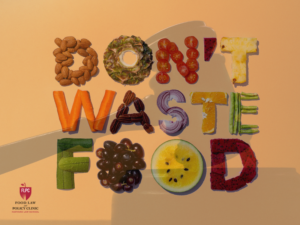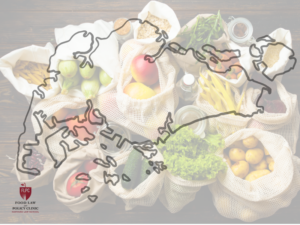Originally written and published by BranchFood.

Maybe mom was right: we should be finishing more of our plates.
The statistics on how much food Americans waste are staggering:
- Collectively, we waste around 40 percent of our food supply;
- On average, every American wastes 400 pounds of food per year;
- The cost of this wasted food is $218 billion, or 1.3 percent of the U.S. gross domestic product.
Food waste is obviously an equity issue. Feeding the world gets more difficult each year, as the population explodes (expected to top 9 billion by 2050) and the extreme weather associated with climate change threaten crop yields in developing countries year over year. Even as we write this, Yemen is on the verge of famine, with 3.2 million children and adults at imminent risk of starving.
But as we can see from the data above, food waste is an economic issue as well. Wasting less of the food produced in the United States would allow more of it to benefit needy families—reducing the financial strains on our social safety net. And from the standpoint of corporate efficiency, millions of American restaurants and food retailers essentially take a sledge hammer to their bottom lines allowing more than 25 tons of food to end up in the landfill each year—costing them $57 billion annually—according to the 2016 ReFed report on food waste.
It appears this issue has finally caught the attention of lawmakers, business leaders, and investors. In fact, food waste reduction is one of the most promising areas for innovation and investment, with ReFed estimating that reducing food waste by 20 percent over the next decade will require an $18 billion investment from the public, private, and non-profit sectors. On the government end, the Commonwealth of Massachusetts has emerged as a leader in curbing food waste, enacting in 2014 a law requiring Bay State businesses and institutions that discard more than a ton of organic matter per week to recycle, compost, or reuse it instead of sending it to a landfill.
Innovative Nonprofits Lead the Way
As has been the case with many other social problems, nonprofit organizations have pioneered innovative solutions to rescue food that would otherwise be headed to landfills. Founded in 2010, Lovin’ Spoonfuls has rescued more than 7.5 million pounds of excess fresh food from grocery stores, farmer’s markets, restaurants, and wholesalers, delivering it to social service agencies and meal programs that serve those in need. Boston Area Gleaners operates under a similar model, harvesting surplus farm crops and donating them to food pantries and meal programs. Cambridge-based Food for Free is something of a hybrid of the first two, serving Boston’s Pine Street Inn with fresh food grown on their farm in Lincoln, while also picking up discarded food and delivering it to communities throughout Eastern Massachusetts. Community Servings utilizes rescued ingredients—much of it donated by farms or other producers—in many of the chef-made meals it prepares for its chronically and critically ill clients.
Finally, a nonprofit grocery store that sells only surplus foods, produce gleaned from local farms, and packaged foods that are near or at their sell-by date. Founded by former Trader Joe’s President-turned-food rescue aficionado Doug Rauch, The Daily Table has thrived at its Washington Street location in Dorchester since 2015, and a second location is currently under construction in Roxbury—set to open sometime in 2018.
Purpose and Profits
These nonprofits play a critical role in both reducing waste and alleviating food insecurity, but a growing number of local entrepreneurs have discovered that having a social purpose doesn’t have to mean not making a profit. With ReFed’s estimates that an $18 billion investment will be necessary to curb food waste over the next decade, private investment is not only needed—it’s a smart business decision.
“In many ways, food waste is an emerging industry, just like recycling was in the 1980s, or renewable energy in the early 2000s,” says Chris Cochran, executive director of ReFed.
Several area startups have worked into their business models solutions for curbing food waste that are great for the planet, great for hungry families, and great for their investors. With a $2.5 million investment from the Fink Family Foundation behind them, Spoiler Alert is expanding its enterprise software that lets restaurants, farms, and manufacturers set up secondary markets for food that would normally be thrown away. It recently partnered up with distributor Sysco, which rakes in $50 billion annually, to begin diverting excess food, for sale or donation, from the dumpster to anti-hunger nonprofits and community groups.
For restaurants and households who’ve found composting to be difficult in the past, Boston-based Bootstrap Compost lessens that burden. Restaurants or households simply fill up one of Bootstrap’s five-gallon buckets with food scraps and leave it outside for one of the business’s drivers to pick up. Bootstrap processes the scraps and, in return, returns fresh composted soil to the customer.
Getting its start in 2008, Waltham-based Harvest was one of the earliest businesses turning discarded organic materials into soils, fertilizers, and clean energy. The anaerobic digester Harvest developed is being utilized by municipalities and large corporations around the world, like the City of Vancouver and Disney World, earning it a spot on the Global CleanTech 100 list. Globally, the anaerobic digestion market, which is at the forefront of smarter large-scale organic waste management, saw around $6.25 million in expenditures and investment in 2016.
Kickstarter-funded Food for All designed a mobile app that allows consumers to purchase, at deep discounts, unsold restaurant meals at the end of the day—with a few touches of their smart phones.
Lazy Bear Tea, founded in Cambridge, has developed its product around a commonly discarded byproduct of the coffee bean. Its bottled iced teas are all made from the cascara, the fruit of the coffee cherry, which typically contributes to 2.25 tons of waste every year and 75 percent of the water pollution associated with coffee production.
Funding the Zero-waste Vision
Fortunately, mission-driven founders are not out on their own in this brave new world of food waste reduction. Plenty of investors—several of which call Greater Boston home— view food rescue and green waste management as wise sectors in which to put their money.
Cambridge-based Fresh Source Capital has made rebuilding local food and agriculture systems the cornerstone of its investments—including food waste reduction. It has pumped funding into Cambridge-born Spoiler Alert, as well as California-based Imperfect Produce—a home and office delivery service that specializes in “ugly” fruits and vegetables that are typically discarded on farms.
Anterra Capital, based in Boston and Amsterdam, invested in Food Freshness Technology, which developed It’s Fresh!: a filter for produce packaging that extends the life of fruits and vegetables and reduces waste throughout the supply chain.
If MissionPoint Partners (which has an office in Boston) has its way, expect the number of investors entering the food waste reduction sector to increase dramatically in the coming years. In 2015, MissionPoint co-launched its ReFed campaign with a goal of educating investors on the issue of food waste and galvanizing $300 million in annual philanthropic giving and impact investment for food waste reduction. More than 30 businesses, foundations, and government leaders came up with 27 cost-effective, scalable solutions to reduce food waste by 20 percent in the next 10 years.
A Waste-Free Future
Curbing food waste is a “triple-bottom-line investment”—benefitting people, healing the planet, and driving economic growth and profits—says Emily Broad Leib, assistant clinical professor at Harvard Law School and founder of the Harvard Food Law and Policy Clinic. Over the last several years, Broad Leib has emerged as a thought leader in strategies for reducing food waste, working with governments and institutions to enact waste reduction policies.
A promising frontier in this movement—one that is largely being led by Broad Lieb and the clinic she directs—is that of reforming date labels on packaged foods. The federal government currently provides no standards regulating such labels, which Broad Leib says rarely refer to a product’s freshness or quality and lead retailers and consumers to discard perfectly edible food. The FLPC has run a campaign to bring awareness to the date labeling issue, and in February 2017, the two main food industry trade groups—Food Marketing Institute and the Grocery Manufacturers Association—announced a voluntary initiative to standardize date labels on consumer-facing packaged foods by the Summer of 2018.
Clearly, the Bay State is fertile soil for public, private, and nonprofit efforts to reduce food waste—which should make all of our mothers very happy.


Health Law & Policy, Commentary
What the Election Could Mean for Medicaid – Health Care on the Ballot
October 21, 2024